人教版九年级全册Unit 2 I think that mooncakes are delicious!Section A(1a-2d)课件(共79张PPT)
文档属性
| 名称 | 人教版九年级全册Unit 2 I think that mooncakes are delicious!Section A(1a-2d)课件(共79张PPT) | 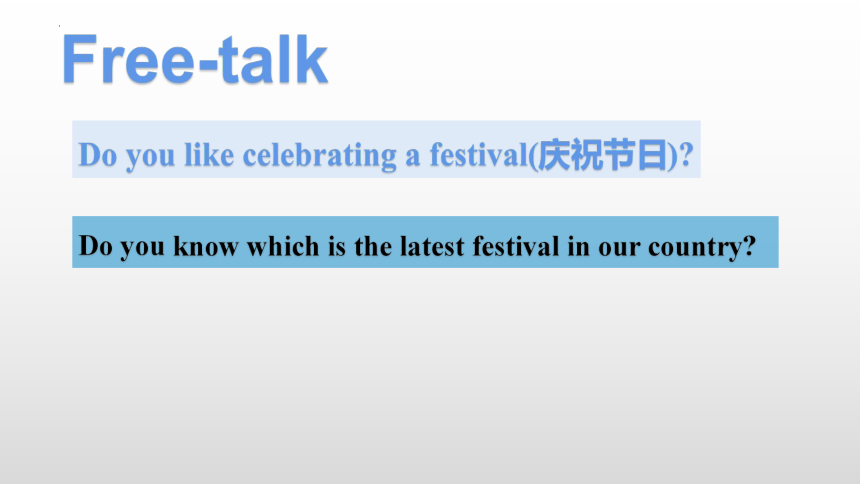 | |
| 格式 | pptx | ||
| 文件大小 | 18.3MB | ||
| 资源类型 | 教案 | ||
| 版本资源 | 人教新目标(Go for it)版 | ||
| 科目 | 英语 | ||
| 更新时间 | 2022-09-06 21:14:36 | ||
图片预览

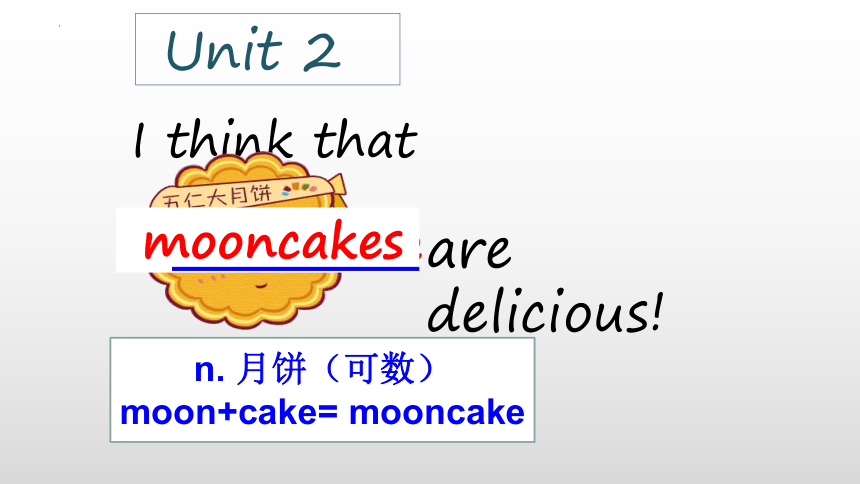
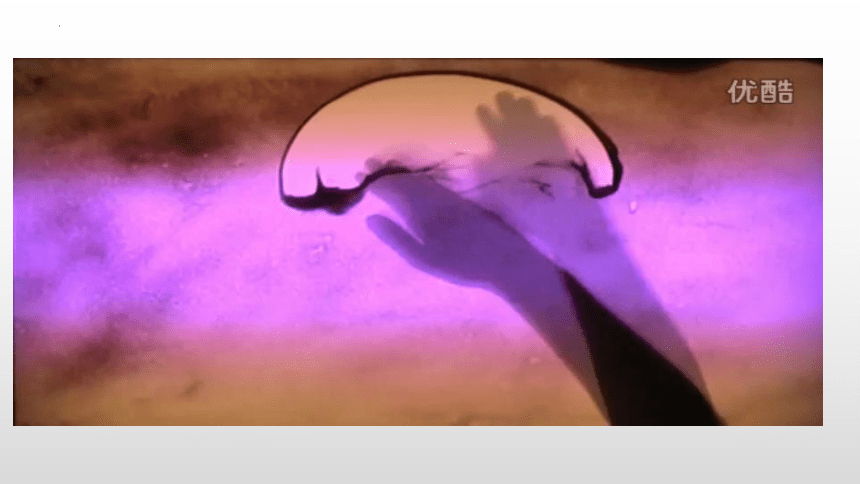
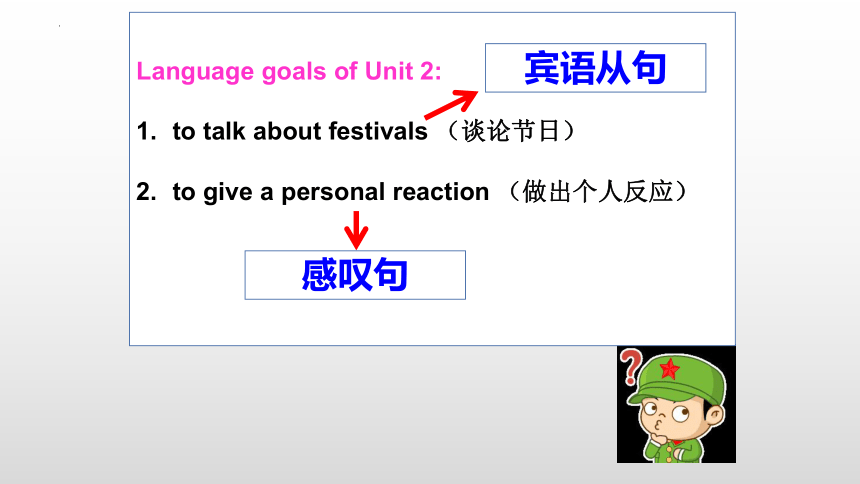
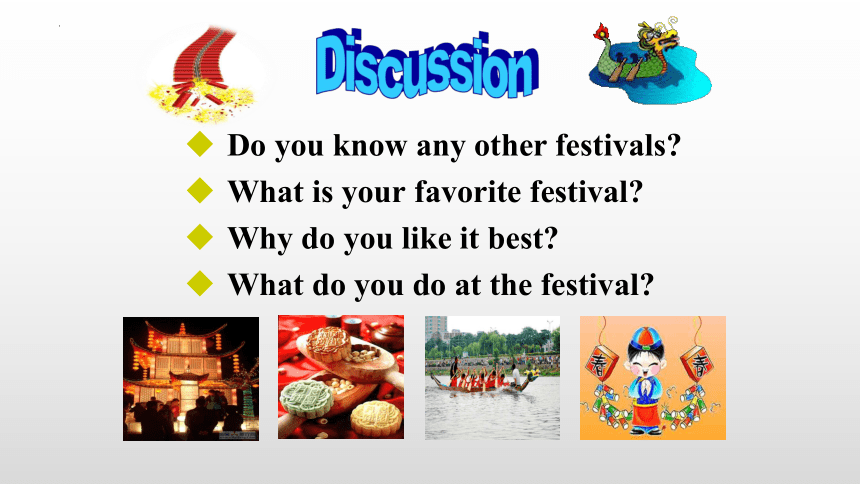
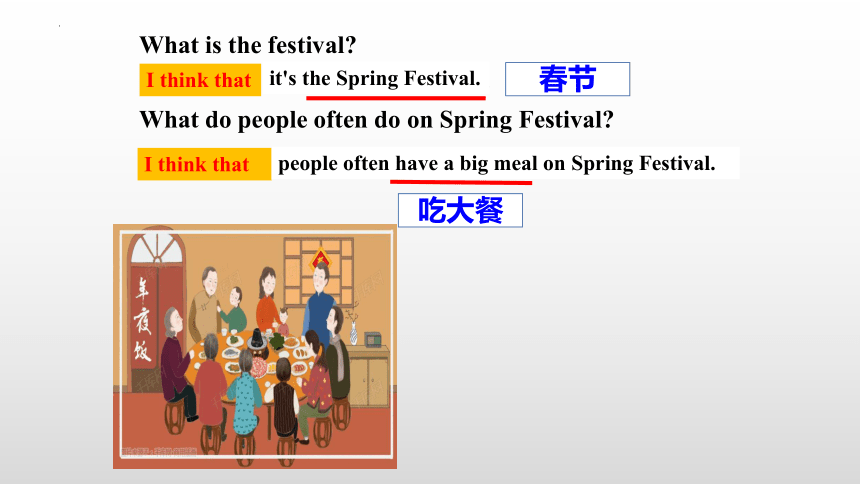
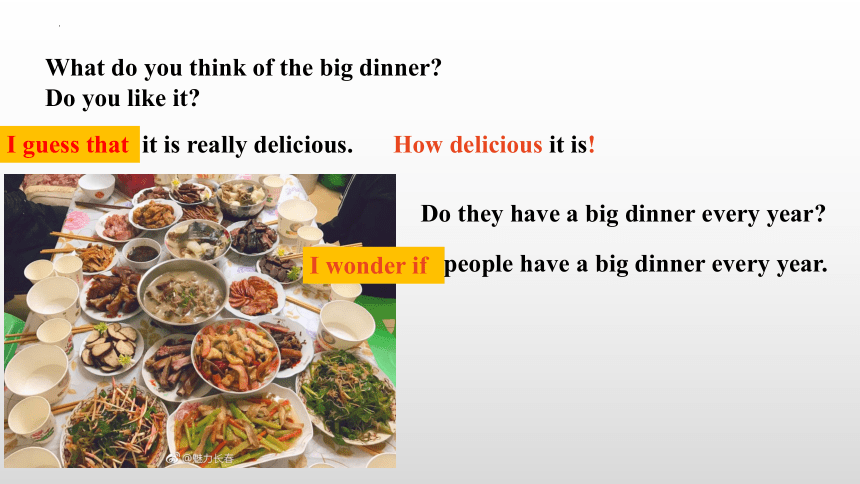
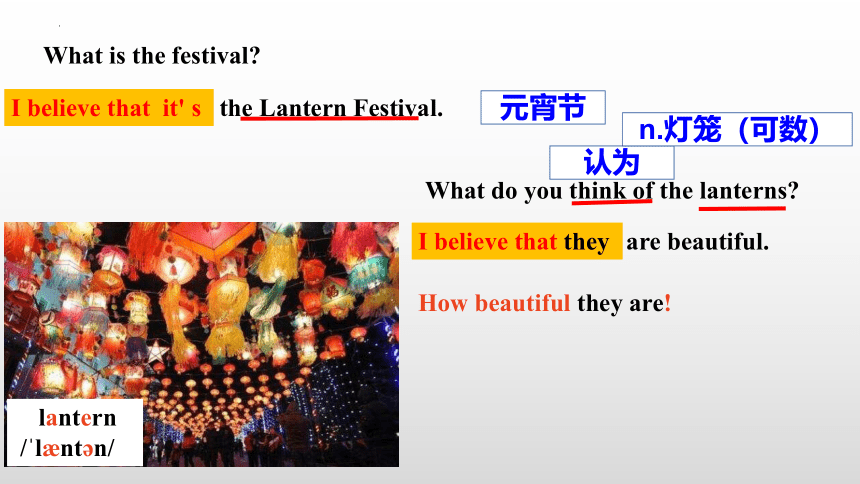
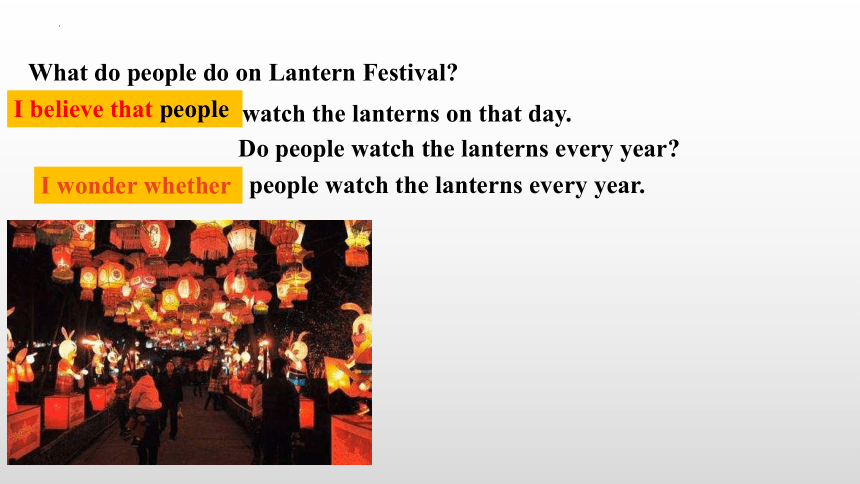
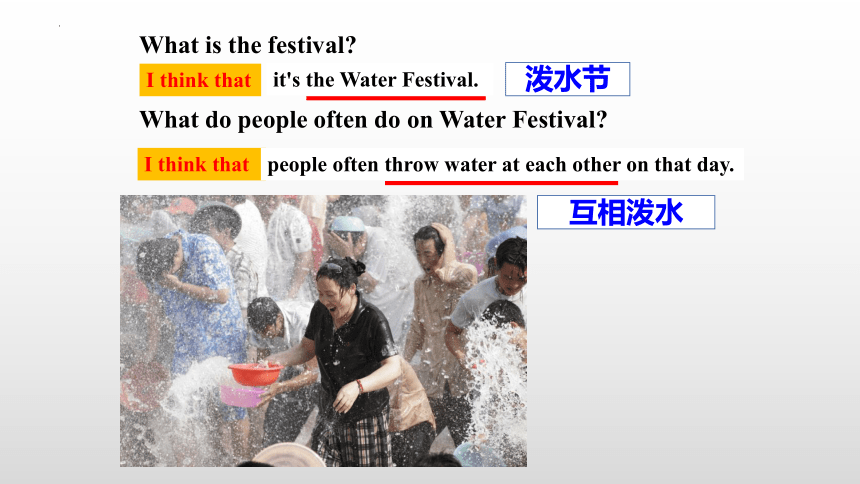
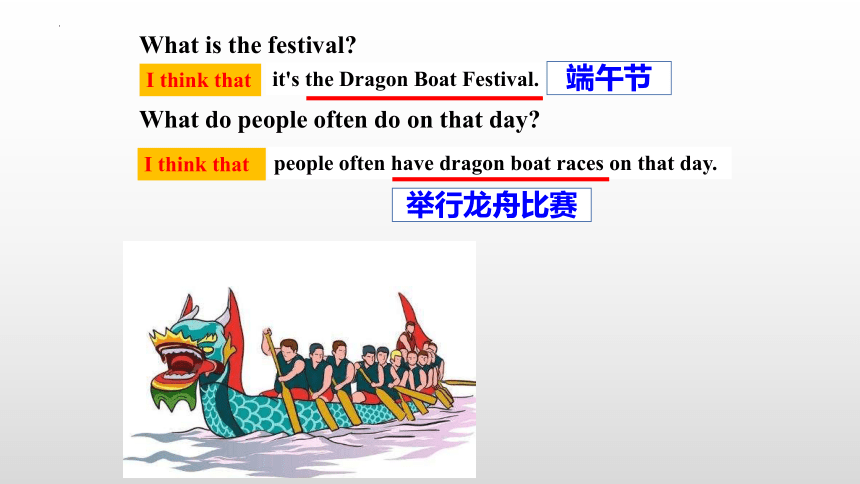
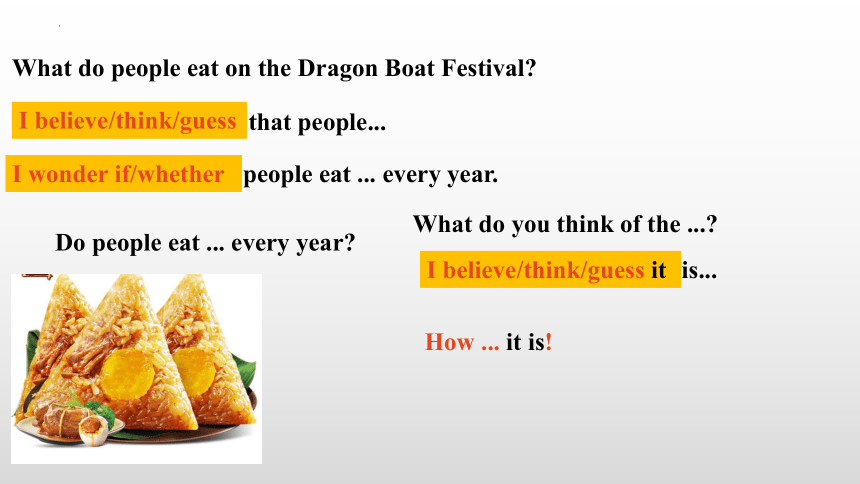
文档简介
(共79张PPT)
Do you like celebrating a festival(庆祝节日)
Free-talk
Do you know which is the latest festival in our country
a mooncake
I think that
are delicious!
Unit 2
mooncakes
n. 月饼(可数)
moon+cake= mooncake
Language goals of Unit 2:
to talk about festivals (谈论节日)
to give a personal reaction (做出个人反应)
宾语从句
感叹句
Discussion
Do you know any other festivals
What is your favorite festival
Why do you like it best
What do you do at the festival
What is the festival
It's the Spring Festival.
I think that
What do people often do on Spring Festival
I think that
it's the Spring Festival.
People often have a big meal on Spring Festival.
people often have a big meal on Spring Festival.
春节
吃大餐
What do you think of the big dinner
Do you like it
it is really delicious.
I guess that
How delicious it is!
I wonder if
people have a big dinner every year.
Do they have a big dinner every year
What is the festival
It's the Lantern Festival.
lantern
/ l nt n/
What do you think of the lanterns
They are beautiful.
I believe that they
How beautiful they are!
元宵节
认为
I believe that it' s
n.灯笼(可数)
What do people do on Lantern Festival
People watch the lanterns on that day.
I believe that people
Do people watch the lanterns every year
I wonder whether
people watch the lanterns every year.
What is the festival
It's the Water Festival.
I think that
What do people often do on Water Festival
I think that
it's the Water Festival.
People often throw water at each other on that day.
people often throw water at each other on that day.
泼水节
互相泼水
What is the festival
It's the Dragon Boat Festival.
I think that
What do people often do on that day
I think that
it's the Dragon Boat Festival.
People often have dragon boat races on that day.
people often have dragon boat races on that day.
端午节
举行龙舟比赛
What do people eat on the Dragon Boat Festival
that people...
I wonder if/whether
What do you think of the ...
people eat ... every year.
I believe/think/guess
How ... it is!
It is...
I believe/think/guess it
Do people eat ... every year
What is the festival
It's the Water Festival.
What do people do on Water Festival
People throw water at each other on that day.
I guess that people
What do you think of the people
They are... .
I guess that they
How happey they are!
I guess that it's
_____ The Water Festival in Thailand
_____ The Dragon Boat Festival in Hong Kong
_____ The Chinese Spring Festival in Beijing
_____ The Lantern Festival in Jiangxi
b
a
c
d
1a
Match the pictures with the descriptions.
n. 描述
description
Listen and circle T for true or F for false.
Bill thinks that the races were not that interesting to watch.
Mary thinks that the teams were fantastic.
Bill wonders whether they’ll have zongzi again next year.
Bill and Mary believe that they’ll be back next year to watch the races.
1b
T F
T F
T F
T F
really
the races
Listen again and answer the questions.
Why does Bill like the races best
What festival are they talking about
Because he thinks they are really interesting to watch and the dragon boat teams are fantastic.
The Dragon Boat Festival.
Fill in blanks according to the listening.Bill and Mary loved the boat races. They were really interesting____ _______. The dragon boat teams were _______. And the colors of the boats were _______. Mary likes to have more people________. It makes things _________ . They both like eating ________. Bill wonders whether they’ll have the ______ again next year. They both believe that they’ll be back next year to watch the races.to watchfantasticprettyaroundmore excitingZong ziracesNotes
I guess it was a little too crowded.
有点儿太拥挤
crowded adj. 人多的;拥挤的
1. 比较级:more crowded
最高级:the most crowded
2. 短语: A be crowded with B
3. 反义词: uncrowded adj. 人少的
4. crowd n. 人群;观众(可数)
Notes
2. Bill thinks that the races were not that interesting to watch.
that 的用法:
1) 做指示代词:那个
2)引导宾语从句,没有实际意义
3)做程度副词,“那么;非常”的意思,常用于否定句中
相当于very
2. 句型:sth. be adj. to do. 做某事怎么样
翻译: 学英语很容易。
English is easy to learn.
宾语从句(object clause)
We know him.
We know that he likes English.
主s
谓v
宾o
主s
谓v
宾o
引导词
由一句话充当宾语的句子称之为宾语从句。
(1)时态:
①主句是一般过去时态,从句用过去的某种时态。
He told me that he worked in that factory.
②主句是一般现在时态,从句的时态根据实际的情况确定。
例如: Do you know who will come this afternoon
③ 宾语从句表述客观真理,客观事实,自然现象等时,不管主句是什么时态,从句都要用一般现在时。
The teacher said that light travels much faster than sound.
(2)语序:
宾语从句一律用陈述句的语序,即主语+谓语。
Can you tell me how I get to the post office
(3)连接词
①that无实际意义,口语和非正式文体中可省略。
I don't think (that)you are right.
②if/whether的含义为“是否”,不可省略。
She asked me if/whether I could help her with her English.
If 与whether 的区别
1. I don’t know _______ he will come or not.
2. I don’t care of _______ he is handsome.
3. He wondered ______ to stay here the next week.
4. ______ he will come is not decided.
与or not 连用只能用whether
介词后只能用whether
与to do 不定式连用只能用whether
句首只能用whether
whether
whether
whether
Whether
语法精练
( )1.—Do you know ________ ? I'm going to see him.
—Sorry.I don't know.
A.where does Mr Li live B where did Mr Li live
C.where Mr Li lives D where Mr Li lived
( )2.He told us that the earth _____ round.
A.was B.Is C.be D.has been
C
B
( )3.—Can we visit Hong Kong this summer holiday
—I wonder ________ it is the best time to go there.
A.If B.When C.what D.how
( )4.I wonder ________ achieve a balance between my schoolwork and my hobbies.
A.how can I B.how I can
C.what can I D.what I can
A
B
Listen and circle the correct words.
Wu Ming and Harry are cousins / strangers / friends.
Wu Ming went to Singapore / Hong Kong / Macao for his vacation.
Wu Ming visited his relatives / friends / classmates.
Wu Ming liked eating out / shopping / the Dragon Boat Festival best.
2a
Listen again and fill in the chart.
2b
Downsides
Fun activities
Eating out
Shopping
Dragon Boat Festival in June
put on weight
spent money
weather is hot
Have you been abroad
Which foreign country did you go
Do you know Chiang Mai
Where is it
Free Talk
It is the largest and most culturally significant city in northern Thailand.
It attracts over 5 million visitors each year. It’s on the list of 25 Best Destinations in the World.
Chiang Mai
(清迈府)
Mekong River
(湄公河)
Wat Phra Singh
(普拉辛寺)
Chiang Mai University
(清迈大学)
tuk-tuk
(嘟嘟车)
Khao Soi
(清迈面)
1. Where is Chiang Mai
2. When is the Water Festival
3. What is the time of the Thai New Year
It is in Thailand.
It is from April 13th to 15th.
It is from April 13th to 15th.
5. Why do people do this
4. What did people do at the time of the
year
People go on the streets to throw water at each other.
Because the new year is a time for cleaning and washing away bad things. Then you will have good luck in the new year.
1. Bill wonders whether they’ll …
wonder v. 想知道
wonder n. 惊奇;惊愕;奇迹
There was a look of wonder in his eyes.
他眼中露出惊奇的神色。
The Grand Canyon is one of the natural wonders in the world.
科罗拉多大峡谷是世界自然奇观之一。
wonder about
想知道; 对……感到奇怪; 考虑
wonder at
对……感到惊讶/奇怪
in wonder 在惊奇中
no wonder 难怪,怪不得
with wonder 惊奇地
the wonders of the world 世界奇观
I wonder _____ he will come before 8:00 p.m.
A. what B. that C. when D. if
“I wonder”(我想知道)带有疑问色彩,不能选不带疑问意思的关联词that
宾语从句对时间已有所交代,而且用的come是不及物动词,不用跟宾语
故答案选if (是否) 。
D
2. Guess what
“你知道吗?”、“想不到吧”、 “你猜怎么着?”
常用来引出说话者想要诉说的某件事
通常对于该句型都是以What 回答。
A: Guess what!
你猜猜看!
B: What
什么?
A: I am going to the Amazon Jungle of
Brazil this vacation.
这个假期我要去巴西的亚马逊丛林。
B: That sounds really cool.
听起来太酷了!
3. I’m going to Chiang Mai in two weeks.
根据语境,in two weeks在这句话里的意思是 “两周之后” 。
He’ll be back in two weeks.
他两周后回来。
“in+一段时间” 可与将来时、现在时和过去时连用,表示“在一段时间之内”或者“在一段时间之后”
(2018·广东)
—How soon will we get the offer from a
new high school
—_____ about two months.
A. In B. For
C. Among D. During
A
一般来说,“in + 一段时间”和过去式连用,表示“在某段时间内”
I finished my homework in 2 hours.
我两小时内做完了功课。
知识拓展
4. Sounds like fun. 听起来很有趣。
该句省略了it这个形式主语,完整的句子应是:It sounds like fun.
sound like 听起来像
It sounds like a nice room. Can we take a look at it
听起来房间不错,我们能看一看房间吗?
Their love story sounds like a fairy tale.
他们的爱情故事听起来像童话。
感官动词 + like
feel like 摸起来像
smell like 闻起来像
look like 看起来像
taste like 尝起来像
知识拓展
5. I wonder if it’s similar to …
similar to 跟……类似; 与……同样的
My suffering might be similar to yours.
我的遭遇可能与你的差不多。
His dress is very similar to mine in color.
他衣服的颜色和我衣服的颜色很相似。
知识拓展
be similar in :在某方面相似
Eg: They are similar in character.
他们在性格上相似。
反义短语:
be different from … (与……不同)
Eg: Paul is different from his twins brother.
保罗和他的双胞胎弟弟不一样。
On my visit to Australia, I feel Australians are similar ______ us in many ways.
A. with B. in C. to D. at
— Can you tell the differences between the two pictures
— Differences I’m afraid I can’t. They
look quite ______.
A. different B. similar
C. strange D. interesting
C
B
What + a/an + adj.+ 可数n.+ (主语+谓语) !
How + adj./adv.+ (主语+谓语)!
感
叹
句
What + adj.+不可数 n./ n.复数+ (主语+谓语) !
How + adj. + a/an + n. +(主语+ 谓语)!
注意:what句型可与 how句型转换
如:What a pretty girl she is!
= How pretty the girl is!
5.______ a clever boy Tom is!
1.______ an exciting film it is!
3.______ good news this is!
2.______ clever the boy is!
4.______ quickly he runs!
用 how/what 完成下列感叹句。
What
How
What
What
How
6.______ tall a man he is!
How
Exercise
What festival do you think of when you see the picture
What do you know about the festival
Brainstorm:
admire/enjoy the full moon
Mid-Autumn Festival
food
activities
folk story
mooncakes
get together
lay out mooncakes
in the garden/in the open air
share the mooncakes
with their families
嫦娥奔月
吴刚伐桂
朱元璋与月饼起义
玉兔入月宫
玉兔捣药
the most touching
tell folk stories
Date: August 15th on lunar calendar
eat mooncakes
admire the bright full moon
eat dinner with family members
express strong yearnings (思念) to family members and friends
How do people celebrate the Mid-Autumn Festival
Paragraph 1
Paragraph 2
Paragraph 3
a traditional folk story about Mid-Autumn Festival.
the start of the tradition of the Mid-Autumn Festival.
the celebration of Mid-Autumn Festival in China.
Match the main idea of each paragraph.
Fast reading.
Read and answer the questions.
How do people celebrate the Mid-Autumn Festival
3a
They celebrate the Mid-Autumn Festival by admiring the moon and sharing mooncakes with their families.
2. What story is the reading about
The reading is about a traditional folk story of Hou Yi and Chang’e for the Mid-Autumn Festival.
Read again and put the events in the correct order.
3b
The keys:
4
2
5
1
7
6
3
Complete the sentences with the correct words.
People like to a________ the full moon on the Mid-Autumn night.
The story of Chang’e is one of many t___________ folk stories.
Hou Yi got m_______ medicine for shooting down the nine suns.
Pang Meng wanted to s_______ the medicine.
Hou Yi l______ out fruits and desserts in the garden.
3c
dmire
raditional
agic
teal
aid
Wu Gang Cuts the Laurel
Zhu Yuanzhang and Moon Cake Uprising
1. Chinese people have been celebrating the Mid-Autumn Festival and enjoying mooncakes for centuries
现在完成进行时,表示动作从某一时间开始,一直持续到现在
其构成为:
主语+助动词(have / has) + been + 动词的现在分词+其他
现在完成时和现在完成进行时的区别:
1) 现在完成时强调完成和影响,现在完成进行时强调未完成和动作。
He has painted the room.
他已经粉刷过房间了。(影响:墙壁已粉刷完)
He has been painting the room.
他一直在粉刷房间。(还未粉刷完)
知识拓展
2) 现在完成时陈述事实,现在完成进行时表感彩.
What have you done
你做什么了?(仅是问问)
Where have you been I have been waiting for you in the rain for two hours.
你去哪了?我在雨中等了你两个小时。(不满)
2. … is the most touching
touching adj. 动人的;感人的
His contribution to his family was very touching.
他对家庭的贡献感人至深。
It’s a very touching moment.
那是个非常感人的时刻。
touch v. 触摸;感动;触及;接触
Don’t touch the paint until it’s dry.
油漆未干, 切勿触摸。
Bill hardly touched the ball during the game.
比尔在比赛时几乎没有碰到过球。
Your dress is so long that it can touch the floor.
你的裙子太长了以至于都碰到地面了。
知识链接
3. Whoever drank this could live forever, …
这句话里的主语是Whoever drank this, 同时是一个主语从句,相当于Anyone who drank this
whoever pron. 无论是谁;任何人
Whoever put forward this idea
到底是谁想出的这个主意?
Whoever wins the match can get a prize.
无论是谁赢得了比赛都可以获得奖品。
4. …tried to steal the medicine when Hou Yi was not home.
steal v. 偷;窃取
steal sth. from sb. 从某人那里偷走某物
He stole something from me.
他偷了我的东西。
辨析:steal / rob
从意思上讲steal表示偷窃的意思,而rob表示抢劫的意思;steal sth. from sb. / sth.
rob sb. / sth. of sth.
例如:
He stole money from the rich to give it to the poor.
They robbed the bank of one million dollars.
知识链接
He was seen ______ some money from an old man.
A. to rob B. to steal C. be stolen D. to be robbed
B
感官系动词在被动语态中要进行还原:be seen to do sth.
They knocked him down and _______ him of this bag.
A. rob B. robbed
C. steal D. stole
B
5. He quickly laid out her favorite …
lay out 摆开;布置
Lisa laid out the knives and forks at the table.
丽萨把刀叉摆放在桌子上。
I lay out the map on the ground and search the route to Lhasa.
我把地图摊在地上,查找去拉萨的路线。
They laid out the hill as a park.
他们把这座小山布置成了一座公园。
lay v. 放置;安放;产(卵);下(蛋)
You may lay it on the table.
你可以把它放在桌子上。
Nest is the place where birds lay their eggs and hatch their young.
鸟巢是鸟类产卵和孵化后代的地方。
知识链接
lay, place, put, set这些动词均有“放”之意。
lay指小心地把人或物平放或横放,侧重动作安稳。
place较正式,指把某物放在一个正确的位置上,侧重动作的正确。
put普通用词,含义较广泛。指把人或物置于某处,并将其留在该处。
set普通用词,指为了某种目的而将人或物放在一定位置上。指物时多指立着放。
知识链接
You placed me in a difficult position.
你使我陷入了窘境。
I put the suitcase on the table.
我把手提箱搁在桌上。
They were setting the table for dinner.
他们正在摆餐具准备开饭。
6. How he wished that Chang’e could come back!
这是一个带有宾语从句的感叹句
1) wish v. 祝福,祝愿(表示难以实现的愿望)
①wish that +从句
我希望我会飞。
I wish I could fly.
②wish to do sth. 希望做某事
wish sb. to do sth.希望某人做某事
我希望一夜成名。
I wish to be famous overnight.
My mother wishes me to be famous overnight.
③wish sb. sth. 祝愿某人…
I wish you a good trip!
2) n. 祝愿
Best wishes to you!
7. …, people started the tradition of admiring the moon …
admire v. 欣赏;仰慕
I really admire your enthusiasm.
我为你的热忱而感到钦佩。
We admire (him for) what he has done.
我们对他所做的事很钦佩。
通常的结构是
admire sb. admire sth.
admire sb. for (doing)sth.
我钦佩她的勇气。
误:I admire for her bravery.
正:I admire her for her bravery.
知识链接
admiration n. 钦佩;赞赏
用admire的适当形式填空。
1. The school is widely ________ for its excellent teaching.
2. I really ________ the way she brings
up those kids all on her own.
admired
admire
Do you like celebrating a festival(庆祝节日)
Free-talk
Do you know which is the latest festival in our country
a mooncake
I think that
are delicious!
Unit 2
mooncakes
n. 月饼(可数)
moon+cake= mooncake
Language goals of Unit 2:
to talk about festivals (谈论节日)
to give a personal reaction (做出个人反应)
宾语从句
感叹句
Discussion
Do you know any other festivals
What is your favorite festival
Why do you like it best
What do you do at the festival
What is the festival
It's the Spring Festival.
I think that
What do people often do on Spring Festival
I think that
it's the Spring Festival.
People often have a big meal on Spring Festival.
people often have a big meal on Spring Festival.
春节
吃大餐
What do you think of the big dinner
Do you like it
it is really delicious.
I guess that
How delicious it is!
I wonder if
people have a big dinner every year.
Do they have a big dinner every year
What is the festival
It's the Lantern Festival.
lantern
/ l nt n/
What do you think of the lanterns
They are beautiful.
I believe that they
How beautiful they are!
元宵节
认为
I believe that it' s
n.灯笼(可数)
What do people do on Lantern Festival
People watch the lanterns on that day.
I believe that people
Do people watch the lanterns every year
I wonder whether
people watch the lanterns every year.
What is the festival
It's the Water Festival.
I think that
What do people often do on Water Festival
I think that
it's the Water Festival.
People often throw water at each other on that day.
people often throw water at each other on that day.
泼水节
互相泼水
What is the festival
It's the Dragon Boat Festival.
I think that
What do people often do on that day
I think that
it's the Dragon Boat Festival.
People often have dragon boat races on that day.
people often have dragon boat races on that day.
端午节
举行龙舟比赛
What do people eat on the Dragon Boat Festival
that people...
I wonder if/whether
What do you think of the ...
people eat ... every year.
I believe/think/guess
How ... it is!
It is...
I believe/think/guess it
Do people eat ... every year
What is the festival
It's the Water Festival.
What do people do on Water Festival
People throw water at each other on that day.
I guess that people
What do you think of the people
They are... .
I guess that they
How happey they are!
I guess that it's
_____ The Water Festival in Thailand
_____ The Dragon Boat Festival in Hong Kong
_____ The Chinese Spring Festival in Beijing
_____ The Lantern Festival in Jiangxi
b
a
c
d
1a
Match the pictures with the descriptions.
n. 描述
description
Listen and circle T for true or F for false.
Bill thinks that the races were not that interesting to watch.
Mary thinks that the teams were fantastic.
Bill wonders whether they’ll have zongzi again next year.
Bill and Mary believe that they’ll be back next year to watch the races.
1b
T F
T F
T F
T F
really
the races
Listen again and answer the questions.
Why does Bill like the races best
What festival are they talking about
Because he thinks they are really interesting to watch and the dragon boat teams are fantastic.
The Dragon Boat Festival.
Fill in blanks according to the listening.Bill and Mary loved the boat races. They were really interesting____ _______. The dragon boat teams were _______. And the colors of the boats were _______. Mary likes to have more people________. It makes things _________ . They both like eating ________. Bill wonders whether they’ll have the ______ again next year. They both believe that they’ll be back next year to watch the races.to watchfantasticprettyaroundmore excitingZong ziracesNotes
I guess it was a little too crowded.
有点儿太拥挤
crowded adj. 人多的;拥挤的
1. 比较级:more crowded
最高级:the most crowded
2. 短语: A be crowded with B
3. 反义词: uncrowded adj. 人少的
4. crowd n. 人群;观众(可数)
Notes
2. Bill thinks that the races were not that interesting to watch.
that 的用法:
1) 做指示代词:那个
2)引导宾语从句,没有实际意义
3)做程度副词,“那么;非常”的意思,常用于否定句中
相当于very
2. 句型:sth. be adj. to do. 做某事怎么样
翻译: 学英语很容易。
English is easy to learn.
宾语从句(object clause)
We know him.
We know that he likes English.
主s
谓v
宾o
主s
谓v
宾o
引导词
由一句话充当宾语的句子称之为宾语从句。
(1)时态:
①主句是一般过去时态,从句用过去的某种时态。
He told me that he worked in that factory.
②主句是一般现在时态,从句的时态根据实际的情况确定。
例如: Do you know who will come this afternoon
③ 宾语从句表述客观真理,客观事实,自然现象等时,不管主句是什么时态,从句都要用一般现在时。
The teacher said that light travels much faster than sound.
(2)语序:
宾语从句一律用陈述句的语序,即主语+谓语。
Can you tell me how I get to the post office
(3)连接词
①that无实际意义,口语和非正式文体中可省略。
I don't think (that)you are right.
②if/whether的含义为“是否”,不可省略。
She asked me if/whether I could help her with her English.
If 与whether 的区别
1. I don’t know _______ he will come or not.
2. I don’t care of _______ he is handsome.
3. He wondered ______ to stay here the next week.
4. ______ he will come is not decided.
与or not 连用只能用whether
介词后只能用whether
与to do 不定式连用只能用whether
句首只能用whether
whether
whether
whether
Whether
语法精练
( )1.—Do you know ________ ? I'm going to see him.
—Sorry.I don't know.
A.where does Mr Li live B where did Mr Li live
C.where Mr Li lives D where Mr Li lived
( )2.He told us that the earth _____ round.
A.was B.Is C.be D.has been
C
B
( )3.—Can we visit Hong Kong this summer holiday
—I wonder ________ it is the best time to go there.
A.If B.When C.what D.how
( )4.I wonder ________ achieve a balance between my schoolwork and my hobbies.
A.how can I B.how I can
C.what can I D.what I can
A
B
Listen and circle the correct words.
Wu Ming and Harry are cousins / strangers / friends.
Wu Ming went to Singapore / Hong Kong / Macao for his vacation.
Wu Ming visited his relatives / friends / classmates.
Wu Ming liked eating out / shopping / the Dragon Boat Festival best.
2a
Listen again and fill in the chart.
2b
Downsides
Fun activities
Eating out
Shopping
Dragon Boat Festival in June
put on weight
spent money
weather is hot
Have you been abroad
Which foreign country did you go
Do you know Chiang Mai
Where is it
Free Talk
It is the largest and most culturally significant city in northern Thailand.
It attracts over 5 million visitors each year. It’s on the list of 25 Best Destinations in the World.
Chiang Mai
(清迈府)
Mekong River
(湄公河)
Wat Phra Singh
(普拉辛寺)
Chiang Mai University
(清迈大学)
tuk-tuk
(嘟嘟车)
Khao Soi
(清迈面)
1. Where is Chiang Mai
2. When is the Water Festival
3. What is the time of the Thai New Year
It is in Thailand.
It is from April 13th to 15th.
It is from April 13th to 15th.
5. Why do people do this
4. What did people do at the time of the
year
People go on the streets to throw water at each other.
Because the new year is a time for cleaning and washing away bad things. Then you will have good luck in the new year.
1. Bill wonders whether they’ll …
wonder v. 想知道
wonder n. 惊奇;惊愕;奇迹
There was a look of wonder in his eyes.
他眼中露出惊奇的神色。
The Grand Canyon is one of the natural wonders in the world.
科罗拉多大峡谷是世界自然奇观之一。
wonder about
想知道; 对……感到奇怪; 考虑
wonder at
对……感到惊讶/奇怪
in wonder 在惊奇中
no wonder 难怪,怪不得
with wonder 惊奇地
the wonders of the world 世界奇观
I wonder _____ he will come before 8:00 p.m.
A. what B. that C. when D. if
“I wonder”(我想知道)带有疑问色彩,不能选不带疑问意思的关联词that
宾语从句对时间已有所交代,而且用的come是不及物动词,不用跟宾语
故答案选if (是否) 。
D
2. Guess what
“你知道吗?”、“想不到吧”、 “你猜怎么着?”
常用来引出说话者想要诉说的某件事
通常对于该句型都是以What 回答。
A: Guess what!
你猜猜看!
B: What
什么?
A: I am going to the Amazon Jungle of
Brazil this vacation.
这个假期我要去巴西的亚马逊丛林。
B: That sounds really cool.
听起来太酷了!
3. I’m going to Chiang Mai in two weeks.
根据语境,in two weeks在这句话里的意思是 “两周之后” 。
He’ll be back in two weeks.
他两周后回来。
“in+一段时间” 可与将来时、现在时和过去时连用,表示“在一段时间之内”或者“在一段时间之后”
(2018·广东)
—How soon will we get the offer from a
new high school
—_____ about two months.
A. In B. For
C. Among D. During
A
一般来说,“in + 一段时间”和过去式连用,表示“在某段时间内”
I finished my homework in 2 hours.
我两小时内做完了功课。
知识拓展
4. Sounds like fun. 听起来很有趣。
该句省略了it这个形式主语,完整的句子应是:It sounds like fun.
sound like 听起来像
It sounds like a nice room. Can we take a look at it
听起来房间不错,我们能看一看房间吗?
Their love story sounds like a fairy tale.
他们的爱情故事听起来像童话。
感官动词 + like
feel like 摸起来像
smell like 闻起来像
look like 看起来像
taste like 尝起来像
知识拓展
5. I wonder if it’s similar to …
similar to 跟……类似; 与……同样的
My suffering might be similar to yours.
我的遭遇可能与你的差不多。
His dress is very similar to mine in color.
他衣服的颜色和我衣服的颜色很相似。
知识拓展
be similar in :在某方面相似
Eg: They are similar in character.
他们在性格上相似。
反义短语:
be different from … (与……不同)
Eg: Paul is different from his twins brother.
保罗和他的双胞胎弟弟不一样。
On my visit to Australia, I feel Australians are similar ______ us in many ways.
A. with B. in C. to D. at
— Can you tell the differences between the two pictures
— Differences I’m afraid I can’t. They
look quite ______.
A. different B. similar
C. strange D. interesting
C
B
What + a/an + adj.+ 可数n.+ (主语+谓语) !
How + adj./adv.+ (主语+谓语)!
感
叹
句
What + adj.+不可数 n./ n.复数+ (主语+谓语) !
How + adj. + a/an + n. +(主语+ 谓语)!
注意:what句型可与 how句型转换
如:What a pretty girl she is!
= How pretty the girl is!
5.______ a clever boy Tom is!
1.______ an exciting film it is!
3.______ good news this is!
2.______ clever the boy is!
4.______ quickly he runs!
用 how/what 完成下列感叹句。
What
How
What
What
How
6.______ tall a man he is!
How
Exercise
What festival do you think of when you see the picture
What do you know about the festival
Brainstorm:
admire/enjoy the full moon
Mid-Autumn Festival
food
activities
folk story
mooncakes
get together
lay out mooncakes
in the garden/in the open air
share the mooncakes
with their families
嫦娥奔月
吴刚伐桂
朱元璋与月饼起义
玉兔入月宫
玉兔捣药
the most touching
tell folk stories
Date: August 15th on lunar calendar
eat mooncakes
admire the bright full moon
eat dinner with family members
express strong yearnings (思念) to family members and friends
How do people celebrate the Mid-Autumn Festival
Paragraph 1
Paragraph 2
Paragraph 3
a traditional folk story about Mid-Autumn Festival.
the start of the tradition of the Mid-Autumn Festival.
the celebration of Mid-Autumn Festival in China.
Match the main idea of each paragraph.
Fast reading.
Read and answer the questions.
How do people celebrate the Mid-Autumn Festival
3a
They celebrate the Mid-Autumn Festival by admiring the moon and sharing mooncakes with their families.
2. What story is the reading about
The reading is about a traditional folk story of Hou Yi and Chang’e for the Mid-Autumn Festival.
Read again and put the events in the correct order.
3b
The keys:
4
2
5
1
7
6
3
Complete the sentences with the correct words.
People like to a________ the full moon on the Mid-Autumn night.
The story of Chang’e is one of many t___________ folk stories.
Hou Yi got m_______ medicine for shooting down the nine suns.
Pang Meng wanted to s_______ the medicine.
Hou Yi l______ out fruits and desserts in the garden.
3c
dmire
raditional
agic
teal
aid
Wu Gang Cuts the Laurel
Zhu Yuanzhang and Moon Cake Uprising
1. Chinese people have been celebrating the Mid-Autumn Festival and enjoying mooncakes for centuries
现在完成进行时,表示动作从某一时间开始,一直持续到现在
其构成为:
主语+助动词(have / has) + been + 动词的现在分词+其他
现在完成时和现在完成进行时的区别:
1) 现在完成时强调完成和影响,现在完成进行时强调未完成和动作。
He has painted the room.
他已经粉刷过房间了。(影响:墙壁已粉刷完)
He has been painting the room.
他一直在粉刷房间。(还未粉刷完)
知识拓展
2) 现在完成时陈述事实,现在完成进行时表感彩.
What have you done
你做什么了?(仅是问问)
Where have you been I have been waiting for you in the rain for two hours.
你去哪了?我在雨中等了你两个小时。(不满)
2. … is the most touching
touching adj. 动人的;感人的
His contribution to his family was very touching.
他对家庭的贡献感人至深。
It’s a very touching moment.
那是个非常感人的时刻。
touch v. 触摸;感动;触及;接触
Don’t touch the paint until it’s dry.
油漆未干, 切勿触摸。
Bill hardly touched the ball during the game.
比尔在比赛时几乎没有碰到过球。
Your dress is so long that it can touch the floor.
你的裙子太长了以至于都碰到地面了。
知识链接
3. Whoever drank this could live forever, …
这句话里的主语是Whoever drank this, 同时是一个主语从句,相当于Anyone who drank this
whoever pron. 无论是谁;任何人
Whoever put forward this idea
到底是谁想出的这个主意?
Whoever wins the match can get a prize.
无论是谁赢得了比赛都可以获得奖品。
4. …tried to steal the medicine when Hou Yi was not home.
steal v. 偷;窃取
steal sth. from sb. 从某人那里偷走某物
He stole something from me.
他偷了我的东西。
辨析:steal / rob
从意思上讲steal表示偷窃的意思,而rob表示抢劫的意思;steal sth. from sb. / sth.
rob sb. / sth. of sth.
例如:
He stole money from the rich to give it to the poor.
They robbed the bank of one million dollars.
知识链接
He was seen ______ some money from an old man.
A. to rob B. to steal C. be stolen D. to be robbed
B
感官系动词在被动语态中要进行还原:be seen to do sth.
They knocked him down and _______ him of this bag.
A. rob B. robbed
C. steal D. stole
B
5. He quickly laid out her favorite …
lay out 摆开;布置
Lisa laid out the knives and forks at the table.
丽萨把刀叉摆放在桌子上。
I lay out the map on the ground and search the route to Lhasa.
我把地图摊在地上,查找去拉萨的路线。
They laid out the hill as a park.
他们把这座小山布置成了一座公园。
lay v. 放置;安放;产(卵);下(蛋)
You may lay it on the table.
你可以把它放在桌子上。
Nest is the place where birds lay their eggs and hatch their young.
鸟巢是鸟类产卵和孵化后代的地方。
知识链接
lay, place, put, set这些动词均有“放”之意。
lay指小心地把人或物平放或横放,侧重动作安稳。
place较正式,指把某物放在一个正确的位置上,侧重动作的正确。
put普通用词,含义较广泛。指把人或物置于某处,并将其留在该处。
set普通用词,指为了某种目的而将人或物放在一定位置上。指物时多指立着放。
知识链接
You placed me in a difficult position.
你使我陷入了窘境。
I put the suitcase on the table.
我把手提箱搁在桌上。
They were setting the table for dinner.
他们正在摆餐具准备开饭。
6. How he wished that Chang’e could come back!
这是一个带有宾语从句的感叹句
1) wish v. 祝福,祝愿(表示难以实现的愿望)
①wish that +从句
我希望我会飞。
I wish I could fly.
②wish to do sth. 希望做某事
wish sb. to do sth.希望某人做某事
我希望一夜成名。
I wish to be famous overnight.
My mother wishes me to be famous overnight.
③wish sb. sth. 祝愿某人…
I wish you a good trip!
2) n. 祝愿
Best wishes to you!
7. …, people started the tradition of admiring the moon …
admire v. 欣赏;仰慕
I really admire your enthusiasm.
我为你的热忱而感到钦佩。
We admire (him for) what he has done.
我们对他所做的事很钦佩。
通常的结构是
admire sb. admire sth.
admire sb. for (doing)sth.
我钦佩她的勇气。
误:I admire for her bravery.
正:I admire her for her bravery.
知识链接
admiration n. 钦佩;赞赏
用admire的适当形式填空。
1. The school is widely ________ for its excellent teaching.
2. I really ________ the way she brings
up those kids all on her own.
admired
admire
同课章节目录
- Unit 1 How can we become good learners.
- Section A
- Section B
- Unit 2 I think that mooncakes are delicious!
- Section A
- Section B
- Unit 3 Could you please tell me where the restroom
- Section A
- Section B
- Unit 4 I used to be afraid of the dark.
- Section A
- Section B
- Unit 5 What are the shirts made of?
- Section A
- Section B
- Review of Units 1-5
- Unit 6 When was it invented?
- Section A
- Section B
- Unit 7 Teenagers should be allowed to choose their
- Section A
- Section B
- Unit 8 It must belong to Carla.
- Section A
- Section B
- Unit 9 I like music that I can dance to.
- Section A
- Section B
- Unit 10 You're supposed to shake hands.
- Section A
- Section B
- Review of Units 6-10
- Unit 11 Sad movies make me cry.
- Section A
- Section B
- Unit 12 Life is full of the unexpected
- Section A
- Section B
- Unit 13 We're trying to save the earth!
- Section A
- Section B
- Unit 14 I remember meeting all of you in Grade 7.
- Section A
- Section B
- Review of Units 11-14
